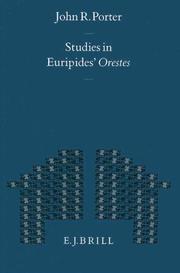| Listing 1 - 1 of 1 |
Sort by
|

ISBN: 9004096620 9004329242 9789004096622 9789004329249 Year: 1994 Volume: 128 Publisher: Leiden ;New York E.J. Brill
Abstract | Keywords | Export | Availability | Bookmark
 Loading...
Loading...Choose an application
- Reference Manager
- EndNote
- RefWorks (Direct export to RefWorks)
This work challenges recent critical assessments that emphasize the allegedly subversive elements in Euripides' play. The Orestes is found to present a curious mélange of early and late Euripidean features, resulting in a drama where the tragic potential of Orestes' predicament becomes lost amid the moral, political and situational chaos that dominates the late Euripidean stage. Throughout, emphasis is placed on reading the Orestes in light of Greek stage conventions and the poet's own practice. Of particular interest are: an original examination, in light of Greek rhetorical practice, of Orestes' agon with Tyndareus; an analysis of the Phrygian's monody as a cunning hybrid of Timothean nome and traditional messenger speech; and a re-evaluation of the play's troubling deus ex machina.
Euripides --- Orestes (Greek mythology) --- Greek drama --- Oreste (Mythologie grecque) --- Théâtre grec --- Drama --- History and criticism --- Théâtre --- Histoire et critique --- Euripides. --- Orestes (Greek mythology) in literature. --- Orestes (Greek mythology) in literature --- Euripide --- Théâtre grec --- Théâtre --- Orestes, --- Literature. --- Belles-lettres --- Western literature (Western countries) --- World literature --- Authors --- Authorship --- Orest, --- Orestas, --- Oreste, --- Oresti, --- Oresto, --- Oresztész, --- Orestes (Euripides) --- Euripidis Orestes (Euripides) --- Philology
| Listing 1 - 1 of 1 |
Sort by
|

 Search
Search Feedback
Feedback About UniCat
About UniCat  Help
Help News
News